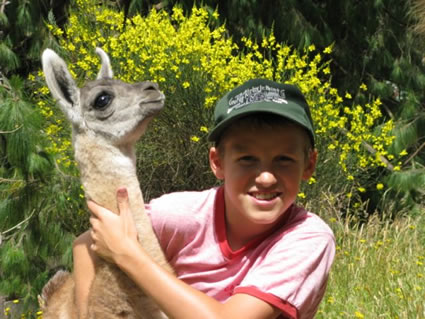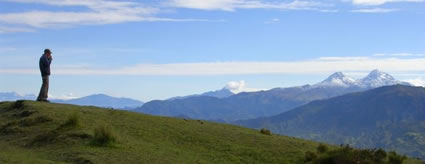Slow Tourism in Ecuador
Travel That Raises Awareness
Article and Photos by Andres Hammerman

|
|
Sam with a new born Llama.
|
My wife and I were slow travelers over 15 years ago before we moved to Ecuador and built the Black Sheep Inn. We began exploring South America in Venezuela, arriving with an open airline ticket and no itinerary. Our goal was to travel six months to a year or until the money ran out. Using the South American Handbook (the bible for travel in the continent back then) as a guide, we chose destinations. If we liked where we ended up, we stayed. By studying detailed maps, we deliberately chose villages not included in the guidebook. We enjoyed going one step further to ensure that we were genuinely off-the-beaten-path.
Sometimes, we arrived in villages without accommodations, so we knocked on doors to find a family to stay with. We hitchhiked by boat around the Paria Peninsula, the northeast corner of Venezuela that juts out towards Trinidad. The peninsula had no roads, so when we were ready to move on, we asked local fishermen to take us to the next village and slept in hammocks with friendly families. We saw no tourists during this 2-week adventure. We ate the fisherman's meal of fresh (or salted) tuna for breakfast, lunch, and dinner.
We spent two months in Venezuela but only saw a small section of the Northeast coast and a bit of the high mountains of Merida — our first taste of the Andes. In Ecuador, we spent over a month on the coast but visited only three beaches. We spent another couple of months in the high Andes. That is when we "discovered" our future home in Chugchilán, which is now the home of the Black Sheep Inn.
A Brief History of Travel to Ecuador
How people travel in the 21st century has changed compared to a century ago. Over 100 years ago, people traveled less and did so out of necessity — usually for business or family. Of course, there were still adventurers, explorers, and even tourists. But to travel a century ago, people needed to make serious decisions and carefully plan. Such travel included arranging transportation by ship, train, motor coach, or horse. They had to pack their trunks carefully with clothes, money, and sometimes food and cooking items. Currency was not readily available once leaving home.
Would you have vacationed in Ecuador in 1925 if it took over 12 days? In 1925, "new ships made the run between New York and Guayaquil in 12½ days."* In 1944, it took over 36 solid hours by plane and train to travel one way from Guayaquil to New York.** This was considered a fast travel compared to 20 years earlier. Travelers had to be open to new and different foods, changing comfort levels, and varying service levels. Traveling changed lives permanently.
On the Ethics of Slower Travel
We now live in a world that has shrunk. With modern air transportation and electronic communications, almost every location on the planet is accessible; blogs tell you where to go, and the few remaining guidebook series are competitive. As a traveler, it is easy to get from one country to another, find accommodations, food, and activities, and still feel adventurous. But in this modern and interdependent world where we travel easily and understandably seek enjoyment and uniqueness, there are also new ethical responsibilities for those aware of the enormous issues in the world about them. Where do your tourist dollars go? Do you interact with local communities? What is your effect on local cultures and the environment of the land you visit?
If you are concerned about the apparent reality of global warming, eating local foods, growing organic products, and developing alternative energy, then it is easy to be an eco-traveler. Ecotourism is not just about visiting natural areas such as jungles, deserts, beaches, mountains, etc.; it is about communities, cultures, and environmental impact. Speed is one of the most critical and challenging aspects of travel. Based on our experience, we suggest that you slow down, research where you are going, learn the local language, and choose ecolodges and tour operators that support local communities while having a low environmental impact.
Traveling to Ecuador from virtually any North American city in four to twelve hours is now possible. The journey is easy, and many travelers need to consider the implications of their movements. They buy an airline ticket, pack the bags (often rushed), and the adventure begins. But once you have landed in Ecuador, you must consider what to see and do with the available time.
Often, "tourists" bring a list of must-see attractions, but if it means never staying in one place for more than a day, what are these people missing? A "traveler" will find a comfortable place to stay and immerse themselves in the area while getting to know the local people, customs, culture, attractions, and environment. Slow traveling takes this further and is also about lessons learned that you can take home while helping to conserve natural resources.
The Black Sheep Inn
Black Sheep Inn is near Quito as the bird flies (85 km/52 miles southwest) but far from Quito as the bus drives. It takes over six hours to get here by public transport. Even in a private 4x4, it takes four and one-half hours due to the twisty, winding roads through spectacular scenery. Tourists and travel agents sometimes request one-night reservations, but we discourage or refuse them. Instead, the Black Sheep Inn encourages slow travel by giving discounts to people who stay longer.
Because of the Black Sheep Inn's rural location, we stock up in bulk on food, hardware, and office items. Planning saves time and money. Buying locally and building with local materials saves time, money, and natural resources. Growing our foods with recycled, composted organic waste makes sense. For us, eco-living and eco-traveling go hand in hand.

|
|
President of the community of Chugchilán on a water search with the Iliniza Twin Peaks in the distance.
|
Options in Ecuador for the Slow
Immersion Traveler
As a slow traveler in Ecuador, there is much to see. Check out authentic ecolodges that support indigenous cultures in the Amazon jungles, see how Darwin processed his thoughts in the Galapagos to write the Theory of Evolution, climb and hike various active volcanoes in the rural Andes, and enjoy whale watching on the Pacific Ocean. Planning does not mean setting an itinerary in stone, but knowing more or less where you want to be based and having the time and freedom to stay.
Often, it is more than where you decide to stay, as getting there is half the fun. For instance, to get from a Jungle Lodge in the Amazon, you may have to travel several hours in a motorized canoe, then six hours by bus to Quito, and then another eight hours by bus to the Pacific Ocean. One option is to break up the journey somewhere in the high Andes.
Conservation often starts at home, but it can also begin while traveling. Save extra vacation time, volunteer if you can, take a leave of absence, or do as we did and expatriate. Even though Ecuador is a small country, and we have been here for 14 years, we have yet to see it all.

|
|
Laguna Quilotoa is a volcanic crater lake at over 12,000 feet in elevation.
|
|
For More Information
Black Sheep Inn: Internationally Acclaimed Award Winning EcoLodge aims to provide a comfortable, educational experience for guests, teaching about the local area, local customs, and Permaculture while contributing to and improving the local community and the natural environment. Their goal is to be a leader in environmental stability and ecotourism. Ecological features include solar panels, adobe construction, composting toilets, recycling, roof water collectors, gray water systems, organic gardens, community education and aid work, reforestation, erosion control, and more. Visit www.blacksheepinn.com for more.
Ecuador travel information on Galapagos Islands, Amazon Jungle, Andes Mountains, and Pacific Coast: Ecuadorexplorer.com.
The Wonderland Ecuador primarily delineates Ecuador's political and territorial organization and describes the economic conditions of the early 1940's. It is a bibliographical curiosity, interesting because very little had been written in English in Ecuador at its publication.
Footnotes:
* The Wonderland Ecuador by Dr. Raphael V Lasso, limited edition, New York: Alpha-Ecuador Publications, 1944, page 168.
** The Wonderland Ecuador by Dr. Raphael V Lasso, page 164.
|
Andres Hammerman is co-owner and developer of the Black Sheep Inn, Ecolodge, Ecuador. He traveled and worked extensively across the Americas before settling in the Andes. In addition, Adres designs and builds new features for the Black Sheep Inn.
|
